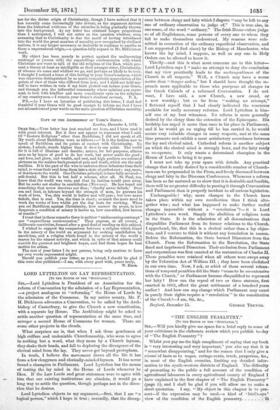COPY OF 'PHE Anoaresnor or YORK'S REPLY.
London, December 4, 1874. DEAR Sut,—Your letter has just_ reached me here. and I have read it with great interest. But it does not appear to represent what I said. Of "Eastern Religions" other than Buddhism, I did not speak at all. My words about Buddhism were as follows :—" It is the fashion now to -speak of Buddhism and its points of contact with Christianity. No system, I admit, stands higher than it does in one point. The world for it is full of illusions and deceits ; nature, for her purposes, allures men on by hopes of good to do her work, but never sends the good ; and love, and glory, and wealth, and rest, and high position are coloured pictures on the sombre background of pain and death, which are the only realities. It is the part of the wise to unfasten these delusions from their mind, to wean their soul from them into a state of perfect rest ; nay,more, 'of deadness to the world. One Christian principle is hero fully secured— self-denial. But this is but half a scheme, after all. St. Paul, too, knew that the world was vain, and that its fashion would pass away. But he seeks not shelter in annihilation (Nirvana). He has found out something that never deceives nor dies ; charity never faileth.' Over sea and land, in labours beyond the strength of man, he pursues his -work of love. Yes, this world is hollow and will pass ; but love never faileth, that is real. Yes, the time is short; so much the more need to -work the works of love whilst yet the day lasts for working. When you set Buddhism against Christianity, how narrow its scope, in how 'desperate a condition of misery it leaves us, bow one-sided, how barren of results !"
I trust that in these remarks there is neither " undiscerning contempt " or "supercilious condescension." They express, at all events, a deliberate conviction, farmed after a good deal of reading on this subject.
I wished to suggest the comparison between a religion which found in the misery of the world an argument for seeking annihilation by asceticism, and a religion which found in the misery of the world a reason for the utmost activity, and which in spite of that misery could daerish the greatest and brightest hopes, and find those hopes its best motive for action.
The rest of your letter I do not pursue, being only anxious to have my own words represented aright.
Should you publish your letter, as you intend, I should be glad if this were also published.—I am, with every good wish, yours truly, W. Esos.


































 Previous page
Previous page